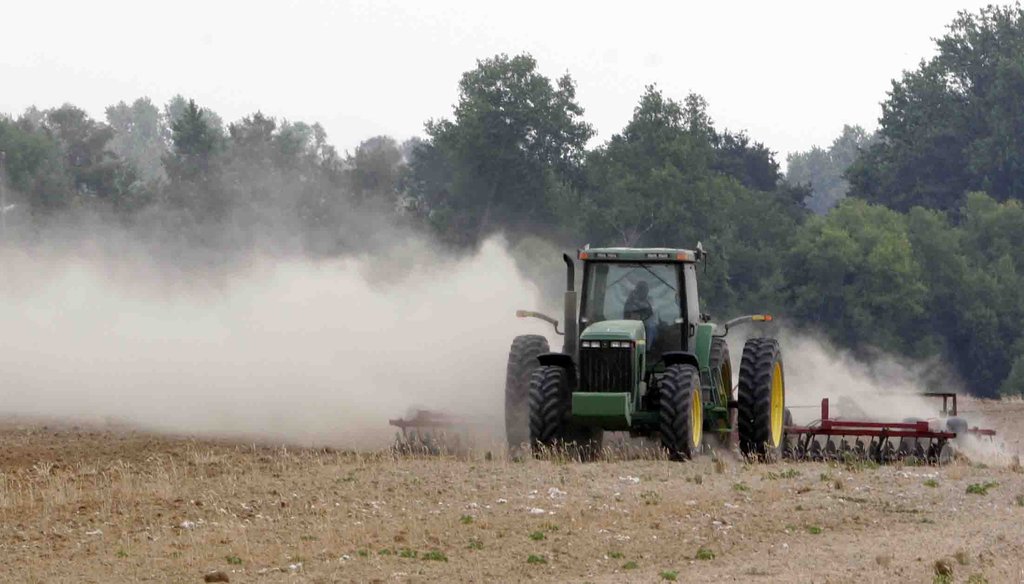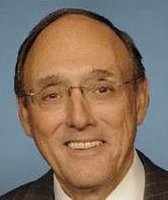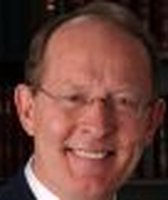Get PolitiFact in your inbox.

Rep. Stephen Fincher is asking audiences to imagine a world where the EPA tries to enforce strict regulations on "farm dust" in rural areas.
Stephen Fincher, R-Tenn., a freshman farmer from rural Crockett County, succeeded in December sponsoring and passing a bill aimed at preventing the Environmental Protection Agency from pursuing more stringent regulations for coarse air particulate pollution. The title of the bill reveals Fincher’s main agenda: "The Farm Dust Regulation Prevention Act."
Because Fincher is continuing to tell audiences that the EPA wants to regulate "farm dust," even as recently as a few weeks ago, we decided to examine his claims. We are not making a Truth-O-Meter ruling because his claims involve opinions or hypotheticals.
Most recently, at an April 5 forum in Dyersburg, Fincher said he had "fought dust legislation" and that "we must cut the EPA’s legs off" because the EPA is "choking this country to death with legislating through the bureaucracy in Washington."
In December, he put it like this: "Under the Clean Air Act, the EPA has the ability to more stringently regulate dust. If the EPA determines more stringent standards are necessary, family farmers and ranchers, as well as rural economies, would be devastated."
In April 2011, Fincher was one of 101 lawmakers signing a letter to EPA Administrator Lisa Jackson that said: "Dust is part of rural America. It is completely unreasonable for the EPA to put a price tag on communities for carrying out activities essential to their well-being. This is a prime example of federal regulations gone too far."
In some cases, Fincher and others are practicing a rhetorical sleight of hand which avoids explicitly stating the agency actually has any such intention. For example, Fincher asks us to "imagine not being able to drive down a dirt road or not being able to plow the soil." While we did try to conjure such a dystopian pastoral, we at the same time wondered whether the EPA had such clarity of purpose. So we asked whether the agency’s efforts to regulate air pollution would affect farm dust in the wind and, if it did, what effect it would have on farmers and the farm economy.
In the course of our review, we also were intrigued at Fincher’s assertion that, "in Arizona, where farm dust is currently regulated, farmers are forced to park tractors on windy days to prevent getting strapped with outrageous fines," and decided to check that out, as well.
When we asked Fincher’s office for supporting background information on the farm dust claim, it noted that Fincher was an original sponsor of the Farm Dust Regulation Prevention Act that he hopes will prevent the EPA from regulating "farm dust." Interestingly, nothing but the bill title mentions such a material.
In fact, the bill simply states that, for a year after its enactment, the EPA administrator "may not propose, finalize, implement or enforce any regulation revising the national primary ambient air quality standard or the national secondary ambient air quality standard applicable to particulate matter with an aerodynamic diameter greater than 2.5 micrometers under Section 109 of the Clean Air Act." It doesn't even mention farms.
But Fincher’s office also sent along a 458-page EPA policy assessment from April 2011 that looked at current coarse air particulate regulations and said EPA "staff concludes that the currently available information clearly calls into question the adequacy of the current standards and that consideration should be given to revising the suite of standards to provide increased public health protection."
There is no current plan to re-examine the EPA’s coarse-air particulate regulations but it is true that EPA staff says one should be considered. Nothing is pending. Fincher’s H.R. 1633, the Farm Dust Regulation Prevention Act, would merely postpone for a year any EPA action – even a proposal to consider a change – affecting such particulates. That may be why U.S. Rep. Chris Van Hollen, D-Md., called the bill a "a solution in search of a problem" during the House debate in December. The measure is pending in the Senate and has not become law.
The EPA already maintains standards regulating such particulates – the kind that clog up air passages in lungs, causing bronchial damage, asthma, and other problems – based on size, not source. Particulates from coal-fired power plants, diesel engines, oil refineries, mines, manufacturing plants – and all kinds of burning – produce coarse particulate pollution, and the EPA tries to limit the public’s exposure to their harmful effects. If dust is part of the mix, then those particulates, too, could factor into the EPA’s determination of a geographic area’s air quality.
But what about farms? The Natural Resources Defense Council’s clean-air director John D. Walke calls the agrarian focus imaginative but "completely misleading" and "utter nonsense." He suggests it is subterfuge used as political window dressing disguising the real focus of such regulation, which has always been industrial pollution, and which the public overwhelmingly supports. There is no effort, and no effort contemplated, to regulate "farm dust," Walke says.
PolitiFact Georgia explored this issue in some detail when former GOP presidential candidate Herman Cain erred in saying the EPA was indeed going to go after dust on farms beginning in 2012. It pointed out: "The EPA has been regulating large particulate matter, including dust, for four decades, but does not single out farm dust or require monitoring in more rural areas."
Factcheck.org’s story about Cain’s claim noted that EPA Administrator Lisa Jackson testified before the U.S. House Committee on Agriculture in March that it was a "mischaracterization" that the EPA is trying to "expand regulation of dust from farms."
And what about that claim about parked tractors out there in the Arizona desert? Arizona Department of Environmental Quality spokesman Mark Shaffer says the state does have dust storms blowing in off the desert but Fincher’s description of the state’s response is "a rather draconian representation of what we do out here."
"Agricultural operations in Arizona have a number of options they can choose from to help control dust, one of which is suspending operations on days that have a high risk of dust," Shaffer explained in a follow-up email. "But agricultural operations can continue on high risk days if another control option is chosen. The Arizona Department of Environmental Quality has never fined an agricultural operation for using tractors on windy days."
So while Fincher and others are saying the EPA could, theoretically, harass a farmer kicking up dust in rural isolation, there is little evidence the agency has now or ever had such an intention.
Our Sources
U.S. Rep. Stephen Fincher Dyersburg Public Forum (dust reference begins at 4:16 point on video):
H.R. 1633: The Farm Dust Regulation Prevention Act,::
Similar claims about EPA efforts to regulate "dust" were examined by PolitiFact Georgia:
Environmental Protection Agency "Policy Assessment for the Review of the Particulate Matter National Ambient Air Quality Standards," April 2011.
Interview with the NRDC’s John D. Walke on April 23, 2012.
Interview with The Arizona Department of Environmental Quality spokesman Mark Shaffer, April 20, 2012 and follow-up email.
American Lung Association poll suggesting 66 percent of Americans polled want stricter EPA air pollution regulations:
http://www.epa.gov/pm/basic.html
Factcheck.org’s examination of the Herman Cain claim.
Regina McCarthy, Assistant Administrator for Air and Radiation for the U.S. Environmental Protection Agency, written testimony to the Subcommittee on Energy and Power of the
Committee on Energy and Commerce of the U.S. House of Representatives.





































